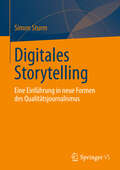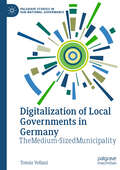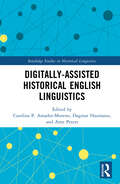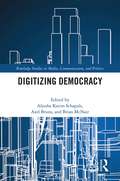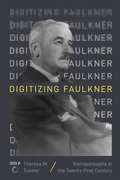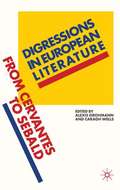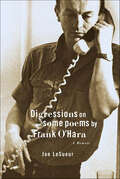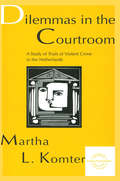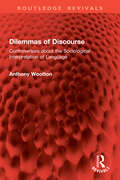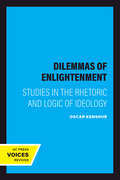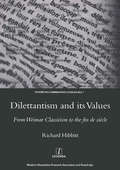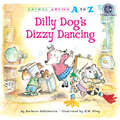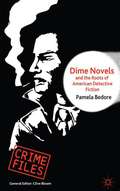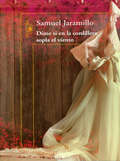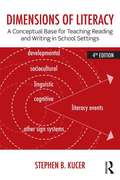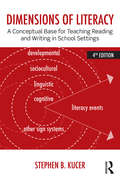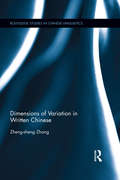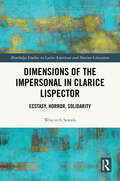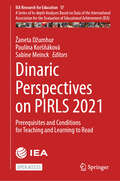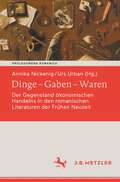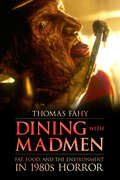- Table View
- List View
Digitales Storytelling: Eine Einführung in neue Formen des Qualitätsjournalismus
by Simon SturmDas Buch gibt einen Einblick in die neuen Erzählweisen des digitalen Journalismus. Es untersucht die Auswirkungen der Digitalisierung auf die Medienbranche und den mit ihr verbundenen Wandel journalistischer Darstellungsformen. Dabei geht es auch um die Möglichkeiten des journalistischen Storytellings auf mobilen Endgeräten wie Tablet-Computern. Es wird eine neuartige Typologie von Darstellungsformen entwickelt, die u ber die klassischen Text-, Audio- und Fernsehformate hinaus digitales Storytelling ermöglicht.
Digitalization of Local Governments in Germany: The Medium-Sized Municipality (Palgrave Studies in Sub-National Governance)
by Tomás VellaniThis book provides an in-depth analysis of the digital policy of medium-sized municipalities in Germany. Mostly ignored by empirical research, the size of these municipalities has been characterized both as an advantage and a limitation for digitalization, with scholars alternately emphasizing agility and shorter administrative paths on the one hand, and the lack of capacity and economies of scale on the other. Utilising a mixed methods approach combining process-tracing and web scraping, the book analyzes the characteristics of digital policy in medium-sized municipalities, and the effects of digitalization governance on service provision. It traces the historical trajectories of digitalization in pioneering municipalities, examines which factors influence favorable digital transformations, and analyzes the organizational structures dedicated to digitalization. The book also puts forward a typology to classify municipalities according to their digital governance, quantitatively describes the landscape of medium-sized municipalities, and delivers insights on the effects of governance on digital services. It will appeal to scholars, students and practitioners of public administration, local government and digitalization.
Digitally-assisted Historical English Linguistics (Routledge Studies in Historical Linguistics)
by Dagmar Haumann Arne Peters Amador-Moreno, Edited by Carolina P.This collection features different perspectives on how digital tools are changing our understanding of language varieties, language contact, sociolinguistics, pragmatics, and dialectology through the lens of different historical contexts. With a clear focus on English, chapters in the volume showcase a broad range of digital methods and approaches that can contribute to advancing the study of historical linguistics. Visualization tools and corpus-linguistic techniques are part of the methodologies included in the volume. The chapters present empirically based research and discuss theoretical aspects that emphasize how digitalization is changing our analysis of different domains of language, going from phonology to specific grammatical/morphosyntactic and lexical features, to discourse-related issues more broadly. This book will be of interest to scholars of the history of the English language, historical linguistics, corpus linguistics, and digital humanities.
Digitizing Democracy (Routledge Studies in Media, Communication, and Politics)
by Axel Bruns Brian McNair Aljosha Karim SchapalsWhat are the key challenges facing our increasingly digitized democracy, and how might we as citizens contribute to resolving them? This book explores these questions, adopting a multi-disciplinary approach that combines work from media studies, journalism studies, and political science scholars, and draws on trends in countries including Australia, the United States, the United Kingdom, Egypt, and Indonesia. The book is divided into four main themes: (1) the impact of digital communication on politics and government; (2) the future of news and journalism in the network society; (3) the potential of digital media to enhance civic engagement and social inclusion; and (4) visions for the future of digital democracy.
Digitizing Faulkner: Yoknapatawpha in the Twenty-First Century
by John Michael Corrigan Stephen Railton Christopher Rieger Melanie Benson Taylor Erin Penner Johannes Burgers Ren Denton Jennie Joiner Ben Robbins Lorie WatkinsFor more than eighty years, Faulkner criticism has attempted to "see all Yoknapatawpha," the fictional Mississippi county in which the author set all but four of his novels as well as more than fifty short stories. One of the most ambitious of these attempts is the ongoing Digital Yoknapatawpha, an online project that is encoding the texts set in Faulkner’s mythical county into a complex database with sophisticated front-end visualizations. In Digitizing Faulkner, the contributors to the project share their findings and reflections on what digital research can mean for Faulkner studies and, by example, other bodies of literature.The essays examine Faulkner’s characters, events, locations, and visualizations, as well as offering more theoretical reflections on digitally mapping specific texts and stories, including the pedagogical implications of this digital approach. Digitizing Faulkner explores how a twenty-first-century research tool intersects with twentieth-century sensibilities, ideologies, behaviors, and material cultures to modify and enhance our understanding of Faulkner’s texts.Contributors:Johannes Burgers, Ashoka University * John Michael Corrigan, National Chengchi University, Taiwan * Ren Denton, East Georgia State College * Jennie Joiner, Keuka College * Erin Penner, Asbury University * Stephen Railton, University of Virginia * Christopher Rieger, Southeast Missouri State University * Ben Robbins, University of Innsbruck * Melanie Benson Taylor, Dartmouth College * Lorie Watkins, William Carey University
Diglossia and Language Contact
by Lotfi SayahiThis volume provides a detailed analysis of language contact in North Africa and explores the historical presence of the languages used in the region, including the different varieties of Arabic and Berber as well as European languages. Using a wide range of data sets, it provides a comprehensive analysis of the mechanisms of language contact under classical diglossia and societal bilingualism, examining multiple cases of oral and written code-switching. It also describes contact-induced lexical and structural change in such situations and discusses the possible appearance of new varieties within the context of diglossia. Examples from past diglossic situations are examined, including the situation in Muslim Spain and the Maltese Islands. An analysis of the current situation of Arabic vernaculars, not only in the Maghreb but also in other Arabic-speaking areas, is also presented. This book will appeal to anyone interested in language contact, the Arabic language, and North Africa.
Digressions in European Literature
by Alexis Grohmann Caragh WellsWith studies of, amongst others, Miguel de Cervantes, Anton Chekhov, Charles Baudelaire and Henry James, this landmark collection of essays is a unique and wide-ranging exploration and celebration of the many forms of digression in major works by fifteen of the finest European writers from the early modern period to the present day.
Digressions on Some Poems by Frank O'Hara: A Memoir
by Joe LeSueurAn unprecedented eyewitness account of the New York School, as seen between the lines of O'Hara's poetryJoe LeSueur lived with Frank O'Hara from 1955 until 1965, the years when O'Hara wrote his greatest poems, including "To the Film Industry in Crisis," "In Memory of My Feelings," "Having a Coke with You," and the famous Lunch Poems—so called because O'Hara wrote them during his lunch break at the Museum of Modern Art, where he worked as a curator. (The artists he championed include Jackson Pollock, Joseph Cornell, Grace Hartigan, Jane Freilicher, Joan Mitchell, and Robert Rauschenberg.) The flowering of O'Hara's talent, cut short by a fatal car accident in 1966, produced some of the most exuberant, truly celebratory lyrics of the twentieth century. And it produced America's greatest poet of city life since Whitman.Alternating between O'Hara's poems and LeSueur's memory of the circumstances that inspired them, Digressions on Some Poems by Frank O'Hara is a literary commentary like no other—an affectionate, no-holds-barred memoir of O'Hara and the New York that animated his work: friends, lovers, movies, paintings, streets, apartments, music, parties, and pickups. This volume, which includes many of O'Hara's best-loved poems, is the most intimate, true-to-life portrait we will ever have of this quintessential American figure and his now legendary times.
Dikengkeng Tsa Tshepo: UBC Contracted
by P.R.S. MaphikeKe boikarabelo ba batswadi ho hodisa ngwana eo. Batho bao e seng badumedi ba fumana bothata. Kgang o ne a tshajwa motseng wa habo. Eitse hoba Mmopi a ba putse ka lesea, a qalella ho ngongoreha ka hore ngwana eo o tla fetoha lejakane a lebale meetlo.
Dikengkeng Tsa Tshepo: UBC Uncontracted
by P.R.S. MaphikeKe boikarabelo ba batswadi ho hodisa ngwana eo. Batho bao e seng badumedi ba fumana bothata. Kgang o ne a tshajwa motseng wa habo. Eitse hoba Mmopi a ba putse ka lesea, a qalella ho ngongoreha ka hore ngwana eo o tla fetoha lejakane a lebale meetlo.
Dilemmas in the Courtroom: A Study of Trials of Violent Crime in the Netherlands (Everyday Communication Ser.)
by Martha L. KomterInteractional dilemmas occur when participants are required to engage in two contradictory activities at the same time or orient to two conflicting goals. The existence of such dilemmas provides a context for interactants to be creative, pro-active, and indeed strategic as they maneuver between the numerous demands placed on them and produce behavior that fits the ongoing communication episode. Trials are one such episode in which the various participants -- in this case, the judge, the defendant, and lawyers -- experience interactional dilemmas and work to resolve these through their behavior. This volume offers an analysis of both the institutional factors which promote dilemmas during court proceedings and the interactional behaviors used by trial participants to navigate these dilemmas. Using ethnomethodology, conversation analysis, and ethnography as complementary methods, Komter's research combines an understanding of the legal rules for courtroom procedure and crime descriptions, with details of actual trial discourse. The analysis is based upon fieldnotes of 48 trials and audiotapes of 31 trials, all related to violent crimes and occurring in courtrooms in Amsterdam, Utrecht, and Haarlem. Dilemmas reflect enduring conflicts of interest or values; they derive from the ongoing institutional and interactional positions of the various courtroom participants. Komter points to the existence of dilemmas and to their role in shaping unfolding interaction during the trials. She especially highlights the different dilemmas faced by judges and suspects, and the ways in which behavior on the part of one constrains that of the other. She further reveals the wide variety of ways in which interactants handle dilemmas -- their innovativeness and resourcefulness -- and the consequences these have for the unfolding interaction and the court's ultimate judgment. Of course, dilemmas are not only relevant to an understanding of judicial interaction. This study has implications for other contexts, since concerns with credibility, blame, responsibility, and morality -- and their opposites -- are incorporated into many everyday interactions. This volume examines behavior that is quite specific to a single context, yet its conclusions bear upon a wide range of communication events. Of interest to scholars in communication, linguistics, anthropology, criminal justice, or those with interests in ethnomethodology, conversation analysis, and ethnography.
Dilemmas of Discourse: Controversies about the Sociological Interpretation of Language (Routledge Revivals)
by Anthony WoottonFirst Published in 1975, Dilemmas of Discourse brings together strands of arguments from disciplines like sociology, anthropology, linguistics and philosophy to explore the debate around the issue of deciding the meaning of what people may say. Can the meaning of words be described satisfactorily as a bundle of semantic features? Can speech acts such as promising and insulting be described as only occurring when a particular form of speech is used in a particular kind of context? Do sociolinguistic rules have a bearing on the problem of extracting the meaning of what people say? What sorts of implications does ethnomethodology have for areas of traditional sociological interest in language such as vocabularies of motives or the relation of language used to social class? These are some of the questions which the author sets out to answer with clarity and carefulness uncharacteristic of much writing on this subject. In general, Dr Wootton defends the ethnomethodological position, and when relating these arguments to developments in mainstream sociology responds to certain criticisms made of recent ethnomethodological writing. But he is also at pains to point out the necessity of subjecting ethnomethodological interpretations to explicit forms of evaluation and suggests some ways in which this might be done. This is a must read for students of sociology.
Dilemmas of Enlightenment: Studies in the Rhetoric and Logic of Ideology (The New Historicism: Studies in Cultural Poetics #26)
by Oscar KenshurOscar Kenshur combines trenchant analyses of important early-modern texts with a powerful critique of postmodern theories of ideology. He thereby contributes both to our understanding of Enlightenment thought and to contemporary debates about cultural studies and critical theory.While striving to resolve "dilemmas" occasioned by conflicting intellectual and political commitments, seventeenth- and eighteenth-century writers often relied upon ideas originally used by their enemies to support very different claims. Thus, they engaged in what Kenshur calls "intellectual co-optation." In exploring the ways in which Dryden, Bayle, Voltaire, Johnson, and others used this technique, Kenshur presents a historical landscape distinctly different from the one constructed by much contemporary theory.
Dilettantism and Its Values: From Weimar Classicism to the Fin De Siecle
by Richard Hibbitt"The concept of dilettantism has not always been associated with amateurism or superficiality. It played a significant role in French and German critical writing from the late eighteenth century until the fin de siecle, embracing notions such as apprenticeship, fruitful error, parody, aestheticism and scepticism. Attempts to define dilettantism in a binary relationship with art have often been defeated by a fundamental ambivalence towards its values. The major texts on the subject are Goethe and Schiller's unfinished 'dilettantism project' (1799) and Paul Bourget's essay on Ernest Renan (1882), although the term was also used by writers including Wieland, Baudelaire, Laforgue, Nietzsche, Hofmannsthal and Thomas Mann. In this wide-ranging study Richard Hibbitt provides the first book-length comparative analysis of the concept of dilettantism, tracing its chronological development and proposing a synthesis of its diverse aspects and values."
Dilly Dog's Dizzy Dancing (Animal Antics A to Z)
by Barbara deRubertisGet to know Alpha Betty&’s class in the award-winning, 26-book alphabet series ANIMAL ANTICS A TO Z! From Alexander Anteater to Zachary Zebra, it&’s one adventure after another. Zip along with these zany characters as they find new friends, test their talents, and have a rip-roaring good time! Dilly loves to dance. She darts! She dips! She dives through the air! But sometimes her dizzy dancing ends in a dreadful THUD. Can Dilly find a way to dance without the disasters? This series is a perfect read-aloud choice to help kids discover the joy of letter sounds and give them the phonics building blocks they need for reading success. With delightful illustrations by Paddington Bear illustrator R.W. Alley, ANIMAL ANTICS A TO Z is an excellent resource for parents and educators alike. Activities in each book plus free activities online add to the fun.Winner: Teachers&’ Choice Award for Children&’s BooksWinner: Teachers&’ Choice Award for the Family
Dime Novels And The Roots Of American Detective Fiction
by Pamela BedoreThis book reveals subversive representations of gender, race and class in detective dime novels (1860-1915), arguing that inherent tensions between subversive and conservative impulses theorized as contamination and containment explain detective fiction's ongoing popular appeal to readers and to writers such as Twain and Faulkner. "
Dime si en la cordillera sopla el viento
by Samuel JaramilloA partir de la mirada incesante e inquisitiva a una viejafotografía, el narrador de esta novela busca desentrañarlos misterios que ocultan las sonrisas de las tresjóvenes frente a la cámara, en un fugaz momento defelicidad. Este ejercicio abre las puertas a un poderosoesfuerzo de memoria y reflexión y a un impresionantey conmovedor relato de familia.Dime si en la cordillera sopla el viento reconstruye la historia decuatro generaciones de los Polanía, en el Huila, desde su instalación enDiamantina, la abrupta tierra que los verá florecer en los años 30,hasta la pérdida del patrimonio, la frustración de sus aspiracionessociales, la zozobra y el horror ante los primeros brotes de laviolencia que se generalizará en el país en los años sucesivos.Esta novela de Samuel Jaramillo es una obra de granaliento sobre los vientos de violencia política y transformaciónsocial que arrastraron a tantas familias colombianas a lo largo delsiglo xx, y un relato poético, dramático y cercano sobre la vitalidad yfragilidad de la lucha de sus protagonistas.
Dimensions of Literacy: A Conceptual Base for Teaching Reading and Writing in School Settings
by Stephen B. KucerThis popular text, now in its fourth edition, "unpacks" the various dimensions of literacy--linguistic and other sign systems; cognitive; sociocultural; and developmental--and at the same time accounts for the interrelationships among them. Distinguished by its examination of literacy from a multidimensional and interdisciplinary perspective, it provides a strong conceptual foundation upon which literacy curriculum and instruction in school settings can be grounded. Linking theory and research to practice in an understandable, user-friendly manner, the text provides in-depth coverage of the dimensions of literacy, includes demonstrations and "hands-on" activities, examines authentic reading and writing events that reflect key concepts, and summarizes the concepts in tables and figures. Changes in the Fourth Edition * Addresses academic language, new literacies/multiliteracies, and their relationship to literacy learning * More fully develops the developmental dimension of literacy in separate chapters on adult mediation and learner construction * Expands the discussion of multimodal literacies * Extends and integrates the discussion of bilingualism and biliteracy throughout the text * Integrates instructional implications more fully throughout
Dimensions of Literacy: A Conceptual Base for Teaching Reading and Writing in School Settings
by Stephen B. KucerThis popular text, now in its fourth edition, "unpacks" the various dimensions of literacy--linguistic and other sign systems; cognitive; sociocultural; and developmental--and at the same time accounts for the interrelationships among them. Distinguished by its examination of literacy from a multidimensional and interdisciplinary perspective, it provides a strong conceptual foundation upon which literacy curriculum and instruction in school settings can be grounded. Linking theory and research to practice in an understandable, user-friendly manner, the text provides in-depth coverage of the dimensions of literacy, includes demonstrations and "hands-on" activities, examines authentic reading and writing events that reflect key concepts, and summarizes the concepts in tables and figures. Changes in the Fourth Edition* Addresses academic language, new literacies/multiliteracies, and their relationship to literacy learning* More fully develops the developmental dimension of literacy in separate chapters on adult mediation and learner construction* Expands the discussion of multimodal literacies* Extends and integrates the discussion of bilingualism and biliteracy throughout the text* Integrates instructional implications more fully throughout
Dimensions of Phonological Stress
by Harry Jeffrey Heinz Rob Goedemans Van Der HulstStress and accent are central, organizing features of grammar, but their precise nature continues to be a source of mystery and wonder. These issues come to the forefront in acquisition, where the tension between the abstract mental representations and the concrete physical manifestations of stress and accent is deeply reflected. Understanding the nature of the representations of stress and accent patterns, and understanding how stress and accent patterns are learned, informs all aspects of linguistic theory and language acquisition. These two themes - representation and acquisition - form the organizational backbone of this book. Each is addressed along different dimensions of stress and accent, including the position of an accent or stress within various prosodic domains and the acoustic dimensions along which the pronunciation of stress and accent may vary. The research presented in the book is multidisciplinary, encompassing theoretical linguistics, speech science, and computational and experimental research.
Dimensions of Variation in Written Chinese (Routledge Studies In Chinese Linguistics Ser.)
by Zheng-Sheng ZhangDimensions of Variation in Written Chinese uses a corpus-based, multi-dimensional model to account for variation in written Chinese. Using statistical method and two-dimensional visual representation, it provides a concrete and objective view of the internal variation in written Chinese. This book is a timely work that addresses the growing interest in quantitative genre analysis and how knowledge thus gained can contribute to the teaching as well as understanding of the Chinese language. Zheng-sheng Zhang is Professor of Chinese at San Diego State University. He has been a long-term editor of the Journal of Chinese Language teachers Association (now known as Chinese as a Second Language) and is a respected researcher in the field of Chinese linguistics.
Dimensions of the Impersonal in Clarice Lispector: Ecstasy, Horror, Solidarity (Routledge Studies in Latin American and Iberian Literature)
by Wojciech SawalaThis book explores the fictional work of Clarice Lispector (1920–1977), the eminent twentieth-century Brazilian writer. It employs the theoretical framework of "affirmative biopolitics" by Roberto Esposito, engaging with Michel Foucault and Giorgio Agamben, alongside voices like Mircea Eliade, Anthony Giddens, and Agata Bielik-Robson. The focus is on rethinking and valuing “impersonality,” crucial for understanding the anthropological, metaphysical, ethical, and political implications in Lispector's works. The main thesis posits that Lispector’s writings, from journalistic chronicles to significant books like The Passion According to G.H., present a complex anthropological vision marked by an ontological and ethical “deadlock” between personality and impersonality. This vision suggests that humans are trapped in a personal mode of existence, separated from their ontological essence, leading to a metaphysical guilt. The book analyzes this deadlock both in individual and communal-political contexts, highlighting the cryptotheological dimension in Lispector’s mystical and messianic themes rooted in Jewish tradition.
Dinaric Perspectives on PIRLS 2021: Prerequisites and Conditions for Teaching and Learning to Read (IEA Research for Education #17)
by Paulína Koršňáková Sabine Meinck Žaneta DžumhurThis open access book presents insights into the current state of reading literacy in the Dinaric region, namely the education systems in Albania, Croatia, Kosovo[1], Montenegro, North Macedonia, Serbia, and Slovenia. A collection of analyses reveals factors influencing this key capacity of young pupils. Using data from IEA&’s Progress in International Reading Literacy Study (PIRLS) 2021, the book explores teaching and learning reading literacy at the end of primary school (Grade 4) through multiple lenses, such as national reading curricula and textbooks, home and school resources for learning, student wellbeing, teacher education, instructions, and digital assessments. Since the administration of PIRLS 2021 coincided with the Covid-19 pandemic, the book also provides valuable insights into remote teaching and learning and other disruptions caused by the pandemic. This volume builds on the regional research presented in IEA Research for Education Volume 13, Dinaric Perspectives on TIMSS 2019, which explored the teaching and learning of mathematics and science in primary schools across the Dinaric region. Aimed at policymakers, researchers, and practitioners, Dinaric Perspectives on PIRLS 2021 offers multidimensional perspectives on student achievement in reading literacy in a region that is underrepresented in the English-speaking research literature on educational assessments and student performance. [1] This designation is without prejudice to positions on status and is in line with UNSCR 1244/1999 and the ICJ Opinion on the Kosovo declaration of independence.
Dinge – Gaben – Waren: Der Gegenstand ökonomischen Handelns in den romanischen Literaturen der Frühen Neuzeit (Prolegomena Romanica. Beiträge zu den romanischen Kulturen und Literaturen)
by Annika Nickenig Urs UrbanDinge tauchen in der Literatur der Frühen Neuzeit in ganz unterschiedlichen Zusammenhängen auf – sie werden getauscht, verschenkt oder geraubt. Dabei haben sie – jenseits ihres ‚Eigensinns‘ – je andere Funktion und Bedeutung: als handlungstragendes Element, als Mittel der Figurencharakterisierung oder als Gegenstand ökonomischen Handelns. Trotz ihrer Präsenz und ihrer großen Bedeutung vor allem für die ‚Ökonomie der Literatur‘ sind indes die Dinge (anders als Subjekte oder Modalitäten ökonomischen Handelns) von den Literaturwissenschaften bislang kaum untersucht worden. Der Sammelband schließt an aktuelle Forschungen zur ‚materiellen Kultur‘ an und widmet sich erstmals konsequent den Dingen und Gegenständen, die in literarischen Texten der romanischen Literaturen von der Renaissance bis zum 18. Jahrhundert zur Sprache kommen.
Dining with Madmen: Fat, Food, and the Environment in 1980s Horror
by Thomas FahyIn Dining with Madmen: Fat, Food, and the Environment in 1980s Horror, author Thomas Fahy explores America’s preoccupation with body weight, processed foods, and pollution through the lens of horror. Conspicuous consumption may have communicated success in the eighties, but only if it did not become visible on the body. American society had come to view fatness as a horrifying transformation—it exposed the potential harm of junk food, gave life to the promises of workout and diet culture, and represented the country’s worst consumer impulses, inviting questions about the personal and environmental consequences of excess.While changing into a vampire or a zombie often represented widespread fears about addiction and overeating, it also played into concerns about pollution. Ozone depletion, acid rain, and toxic waste already demonstrated the irrevocable harm being done to the planet. The horror genre—from A Nightmare on Elm Street to American Psycho—responded by presenting this damage as an urgent problem, and, through the sudden violence of killers, vampires, and zombies, it depicted the consequences of inaction as terrifying.Whether through Hannibal Lecter’s cannibalism, a vampire’s thirst for blood in The Queen of the Damned and The Lost Boys, or an overwhelming number of zombies in George Romero’s Day of the Dead, 1980s horror uses out-of-control hunger to capture deep-seated concerns about the physical and material consequences of unchecked consumption. Its presentation of American appetites resonated powerfully for audiences preoccupied with body size, food choices, and pollution. And its use of bodily change, alongside the bloodlust of killers and the desolate landscapes of apocalyptic fiction, demanded a recognition of the potentially horrifying impact of consumerism on nature, society, and the self.
